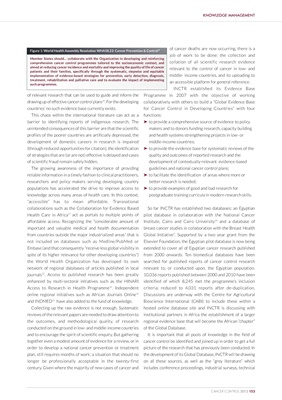
KNOWLEDGE MANAGEMENT
Figure 1: World Health Assembly Resolution WHA58.22: Cancer Prevention & Control10
of cancer deaths are now occurring, there is a
job of work to be done: the collection and
Member States should… collaborate with the Organization in developing and reinforcing
comprehensive cancer control programmes tailored to the socioeconomic context, and collation of all scientific research evidence
aimed at reducing cancer incidence and mortality and improving the quality of life of cancer
relevant to the control of cancer in low- and
patients and their families, specifically through the systematic, stepwise and equitable
implementation of evidence-based strategies for prevention, early detection, diagnosis, middle- income countries, and its uploading to
treatment, rehabilitation and palliative care and to evaluate the impact of implementing
such programmes.
an accessible platform for general reference.
INCTR established its Evidence Base
of relevant research that can be used to guide and inform the Programme in 2007 with the objective of working
drawing up of effective cancer control plans10. For the developing collaboratively with others to build a “Global Evidence Base
countries’ no such evidence base currently exists. for Cancer Control in Developing Countries” with four
This chaos within the international literature can act as a functions:
barrier to identifying reports of indigenous research. The ‰ to provide a comprehensive source of evidence to policy
unintended consequences of this barrier are that the scientific makers and to donors funding research, capacity building
profiles of the poorer countries are artificially depressed, the and health systems strengthening projects in low- or
development of domestic careers in research is impaired middle-income countries;
(through reduced opportunities for citation), the identification ‰ to provide the evidence base for systematic reviews of the
of strategies that are (or are not) effective is delayed and cases quality and outcomes of reported research and the
of scientific fraud remain safely hidden. development of contextually-relevant evidence-based
The growing awareness of the importance of providing guidelines and national cancer control plans;
reliable information in a timely fashion to clinical practitioners, ‰ to facilitate the identification of areas where more or
researchers and policy makers serving developing country better research is needed;
populations has accelerated the drive to improve access to ‰ to provide examples of good and bad research for
knowledge across many areas of health care. In this context, postgraduate training curricula in modern research skills.
“accessible” has to mean affordable. Transnational
collaborations such as the Collaboration for Evidence Based So far INCTR has established two databases: an Egyptian
Health Care in Africa11 act as portals to multiple points of pilot database in collaboration with the National Cancer
affordable access. Recognizing the “considerable amount of Institute, Cairo and Cairo University16 and a database of
important and valuable medical and health documentation breast cancer studies in collaboration with the Breast Health
from countries outside the major industrialized areas” that is Global Initiative9. Supported by a two year grant from the
not included on databases such as Medline/PubMed or Elsevier Foundation, the Egyptian pilot database is now being
Embase (and that consequently “receive less global visibility in extended to cover all of Egyptian cancer research published
spite of its higher relevance for other developing countries”) from 2000 onwards. Ten biomedical databases have been
the World Health Organization has developed its own searched for published reports of cancer control research
network of regional databases of articles published in local relevant to, or conducted upon, the Egyptian population.
12
journals . Access to published research has been greatly 10,036 reports published between 2000 and 2010 have been
enhanced by multi-sectoral initiatives such as the HINARI identified of which 8,245 met the programme’s inclusion
13
Access to Research in Health Programme . Independent criteria; reduced to 4,031 reports after de-duplication.
online regional initiatives such as African Journals Online14 Discussions are underway with the Centre for Agricultural
15
and INDMED have also added to the fund of knowledge. Bioscience International (CABI) to include these within a
Collecting up the raw evidence is not enough. Systematic hosted online database site and INCTR is discussing with
reviews of the relevant papers are needed to draw attention to institutional partners in Africa the establishment of a larger
the outcomes, and methodological quality, of research regional evidence base that will become the African “chapter”
conducted on the ground in low- and middle-income countries of the Global Database.
and to encourage the spirit of scientific enquiry. But gathering It is important that all pools of knowledge in the field of
together even a modest amount of evidence for a review, or in cancer control be identified and joined up in order to get a full
order to develop a national cancer prevention or treatment picture of the research that has previously been conducted. In
plan, still requires months of work; a situation that should no the development of its Global Database, INCTR will be drawing
longer be professionally acceptable in the twenty-first on all these sources, as well as the “grey literature” which
century. Given where the majority of new cases of cancer and includes conference proceedings, industrial surveys, technical
CANCER CONTROL 2013 153